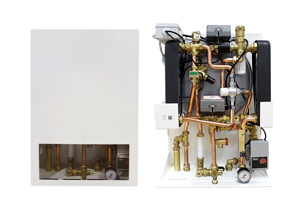Communal heating that delivers

Debris in the primary circuits of communal- and district-heating systems can lead to users not receiving enough heat and hot water. Helen Gibbons of Giacomini goes behind the scenes to explain why.
Problems in communal and district-heating systems generally demonstrate themselves at the point of use, leading the end consumer to believe the issue is located there.
During a recent callout where a fault had been reported at the heat interface unit, I found the strainers protecting the unit both damaged and almost entirely blocked by debris. When emptying just one litre of primary flow water into a jug, the coarse dirt settling at the bottom of the jug came up to the 100 ml mark.
An HIU works by transferring the thermal energy from the primary system over to the secondary systems, via plate heat exchangers. If it is not receiving enough energy from the primary side, then not enough heat can be delivered to the secondary heating and domestic hot water. The thermal energy received from the primary side is a combination of temperature and flow rate. Filters blocked by debris will restrict the flow rate to the HIU and, hence, the energy delivered.
Debris blocking the strainers will also lead to increased pressure drops in the system, reducing the efficiency of the primary pumps.
This is why cleanliness of the water in these systems is essential.
To prevent dirt build up, the water quality of the system needs to be considered as early as at the design stage. To keep the water free of dirt, air and dirt separators need to be included in the system as well as Y-strainers near critical components. Designers should also think about how the system will be maintained and kept at a good standard by including flushing by-passes and drain points, as well as pressure gauges near filters for ease of monitoring differential pressure caused by dirt build up.
We also recommend that dosing pots be incorporated so that the correct water treatment can be included and maintained throughout the lifetime of the system. The water should be continuously monitored and maintained by a water treatment specialist to avoid limescale, oxidisation and corrosion, as these can lead to solid particles building up in the water, which can again block strainers or damage components. Never leave untreated water in the system for a prolonged time.
Moving on from the design stage, prior to commissioning of the system, the pipework needs to be thoroughly flushed to remove all debris that might be present from the construction stage. Dedicating time to flushing the system properly and carefully will save a lot of future problems.

The system needs to be filled with clean, treated water, which prior to filling should have gone through a filtration process, as the mains water can contain contaminants.
If the above processes have been followed, the system should now have been flushed and free from construction debris, filled with clean treated water, treated to prevent future debris build up caused by lime scale and corrosion, and have air and dirt separators as well as filters in place to take out any dirt that might be present despite the precautions.
All that is left now to ensure a long-life, low-maintenance system is to make sure there is a programme in place for cleaning filters and topping up water treatment.
Incorporating these precautionary methods will save a lot of time and money in avoided call outs and repairs. Most importantly though, it will ensure the end consumer has a continuous and uninterrupted supply of heating and hot water.
Helen Gibbons’s technical support manager in the UK.
For more information please visit the link below.







